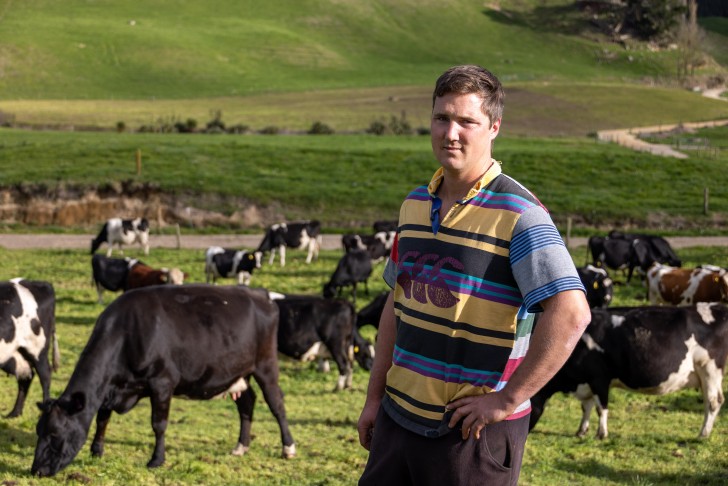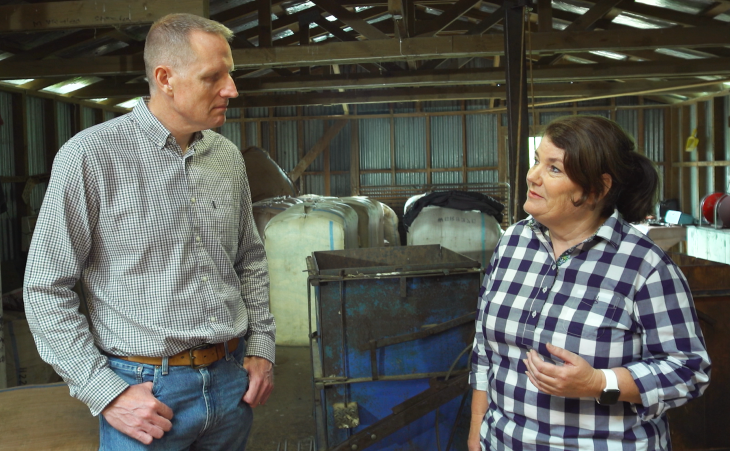Cory’s story: Moving forward after life-changing injury

Former farmer Cory McKinnon says the Kiwi ‘she’ll be right’ attitude needs to change. After suffering a life-changing injury, he’s encouraging farmers to stop and think before operating machinery or completing other tasks.
The day Cory McKinnon lost his leg is still etched in his mind.
Cory was 23 at the time and working on a 600-cow dairy farm in Dargaville, Northland.
On a May morning in 2013, Cory had finished the milking and was loading up silage in the feed-out wagon.
“We were winter milking at the time and fed out about four times a day,” he says.
“A bit of feed would build-up and sit on the platform on top of the wagon, so I got up to scoop all that in. I misplaced my footing and fell in.”
Cory tried to pull himself back up but, as he was climbing out of the wagon, the mixer blade came around and caught his left leg.
“It was probably about 10 to 15 seconds before I realised what had happened,” he says.
“It just felt like a whack to the leg, I didn’t feel anything really at first but then it registered in my brain.”
The blade had cut his leg clean off, just below the knee. He managed to pull himself all the way out and back onto the wagon’s platform.
“I was screaming for help,” he says, vividly remembering the moment.
Fortunately, the farm manager was driving out of a nearby gateway at the time and heard Cory yelling. He shut the tractor off straight away and got on the phone to emergency services.
“He got me into the bucket of the tractor and wrapped my leg in towels while we waited for help to arrive,” Cory says.
“Firefighters were first on the scene, followed by ambulance and a chopper.”
Cory was flown to Whangarei Hospital, where he had his left leg amputated just above the knee.
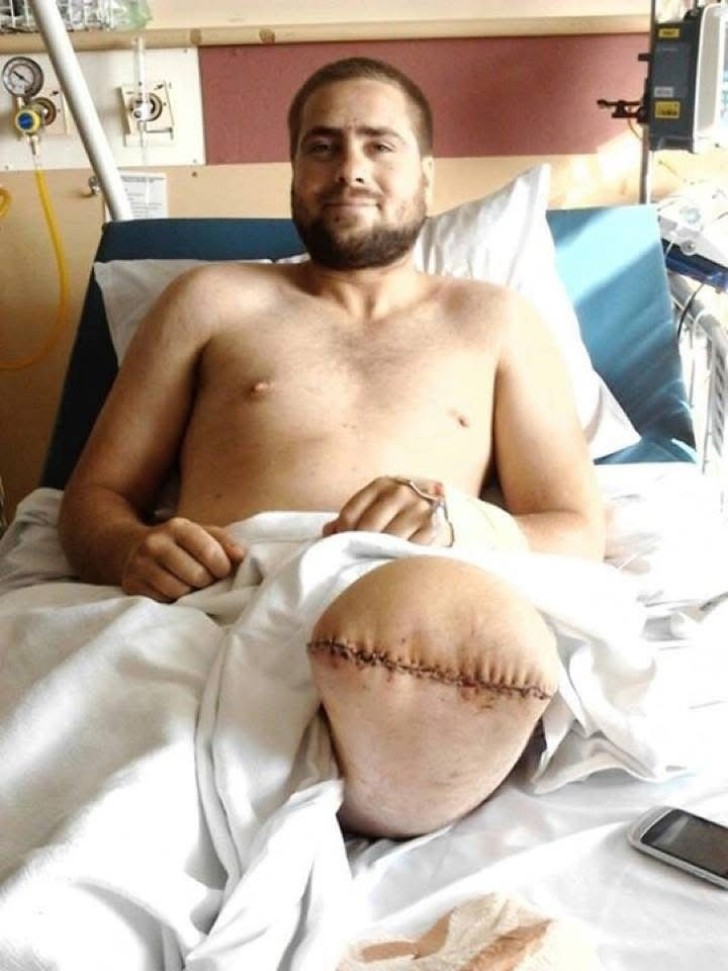
Processing the loss of a leg
Cory spent about a month in hospital before he was able to go home for the remainder of his recovery.
This involved months of doctor visits, trips to an Auckland limb centre to go through the process of getting a prosthetic fitted and rehabilitation in Whangarei to learn how to walk again.
Prior to his accident, Cory was a very active person and spent a lot of time hunting or at the beach.
He said it took him about two years to process he’d lost a leg. During that time, he also lost both his grandfather and father in close succession.
“I think it all hit me at once and I realised that was going to be me for the rest of my life. It was a lot to process, both physically and mentally,” he says.
“I could have continued down a dark path, but I had to move on and not dwell. My leg wasn’t coming back.”
Returning to work and independence
Just a year after his accident, Cory was back farming.
Getting back into work helped him process the injury, regain his independence and start living his life again.
ACC supported Cory through his recovery, getting him back to work with automatic farm vehicles so he could drive them.
But the physical demands of farming did make it difficult for Cory to continue in that career.
He moved to Tauranga in 2016 to be close to a mate and worked for four years in flooring before moving to the Waikato in 2020.
The 35-year-old now lives in Cambridge with his partner and children and drives for Curin Contractors, which does earthworks and civil projects.
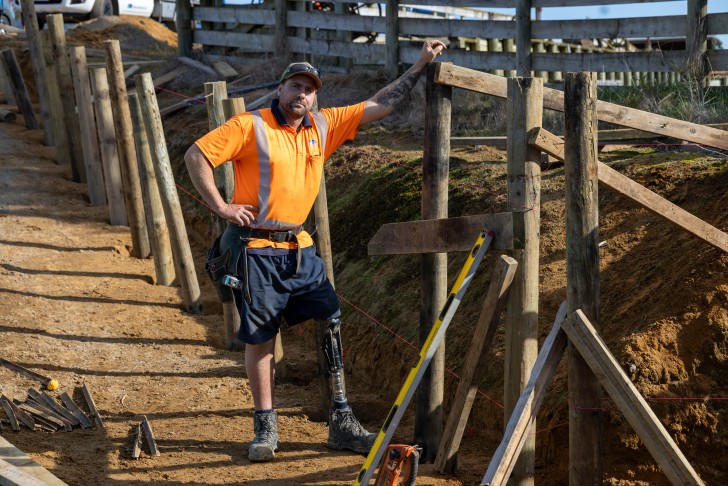
Changing attitudes to change behaviour
Cory still thinks about his accident.
“Sometimes I still think, what if?” he says.
“What if I wasn’t working up there? Accidents happen, especially on the farm, but there are things we can do to try and prevent them from happening in the first place.
“Machinery can be your best friend or your worst enemy so, if you do have to do anything with the feed-out wagon, the silage wagon or any machinery, make sure you turn it off.”
New Zealanders can have a relaxed attitude when it comes to health and safety, he says.
“We get stuck into it and think, ‘she’ll be right.’ But we need to get rid of that attitude and stop and think.”
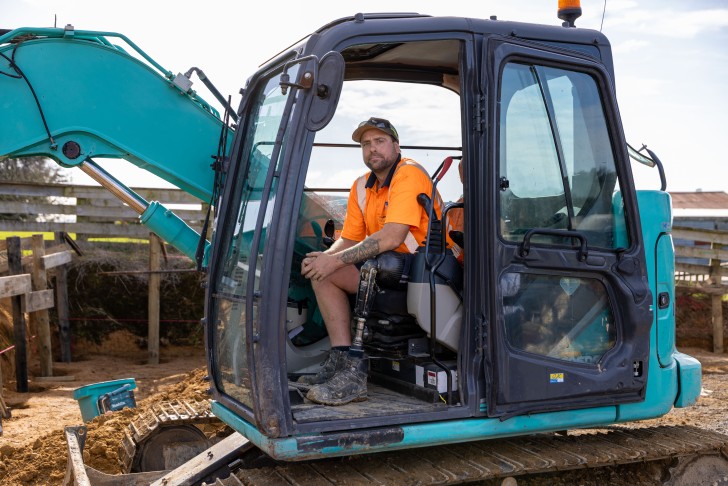
Reducing harm in agriculture
In 2024, ACC accepted over 23,000 new farming-related injury claims and spent around $120 million to help people recover from these injuries.
Research shows exhaustion, lack of sleep, the stresses of farming, isolation from friends and family, and being unable to take a break all add to the risks that a farmer or farm worker will have an accident, ACC Workplace Injury Prevention Manager Paula Wood says.
She says this is something we want farmers to keep in mind during the spring calving period — a notoriously busy time on farms.
“‘Have a Hmmm’ before moving on to the next job,” Paula says.
“When you’re tired and rundown, it affects your decision-making. So take a break when you need it so you can go home safe at the end of every workday.”
Agriculture remains one of the most dangerous sectors for New Zealanders to work in but Paula says ACC is focused on reducing harm, injuries and fatalities in that industry.
“Our partnerships with Safer Farms and Farmstrong are key to supporting this and to driving positive, long-term change.”
ACC announced a new partnership with Safer Farms earlier this year. The partnership will see over $11 million invested by ACC over the next five years to improve safety practices and reduce risks on the ground and in our farming communities.
Farmstrong offers resources and practical wellbeing and mental skills to help farmers and growers manage the ups and downs of the industry and stay safe and well.
There’s a lot of great advice available to farmers through the Farm Without Harm and Farmstrong websites, which both offer a range of practical resources and guidance.




